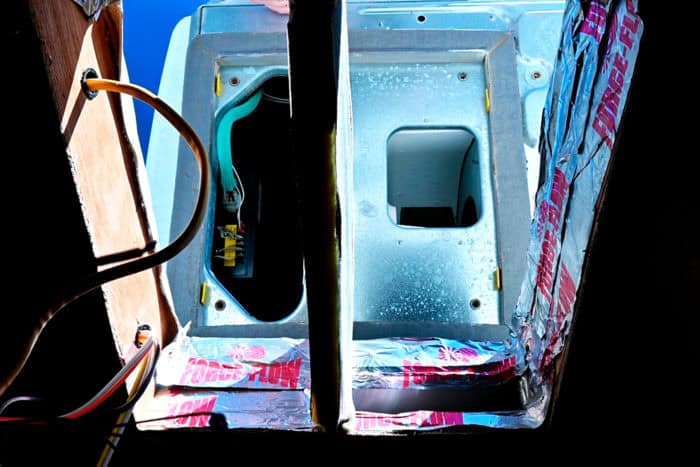Rain, Humidity & the RV Air Conditioner
I’ve you’ve ever been inside an RV during a summer rainstorm you’ve maybe noticed how damp everything starts to feel inside.
Campers are made to be weather proof so no damaging water can get in, but that also means no water can get out.
Related Product: Den-Dry RV Mattress Underlay to Prevent Mattress Mold Growth (click to view on Amazon)
When everyone is inside the camper and the humidity starts to rise it can really start to get uncomfortable inside.
Condensation starts to collect on all of the windows and in other places you might not see.
Mold growth from humid campers is a common problem, especially among full-time RVers.
There are lots of things you can do and get to help prevent mold growth inside your camper, but the most important thing is to keep the humidity levels inside down.
Dehumidifiers are a great way to help this, especially in humid climates but when it’s raining and everyone’s inside, there’s not much a small RV dehumidifier can do.
The best dehumidifier there is on a camper is the RV air conditioner.
See Also: RV Condensation And 14 Ways To Prevent Mold In Your Trailer
Is it Ok to Run the RV Air Conditioner When it’s Raining?
Getting to the point the answer is yes, you can run the RV air conditioner when it’s raining.
We asked this question while spending the winter in southern Texas on the coast.
Humidity was high and to keep the inside of our motorhome dry we would run the RV AC almost every day.
It rained quite a bit while we were down there and we went through some pretty crazy thunderstorms.
It might seem obvious to those who know a lot about RV air conditioners but we really didn’t know if it was ok to run it when it was pouring rain.
After some research and learning about how an RV AC works, we found that it is ok to run an RV AC while it’s raining.
We even ran it during windy rainstorms with heavy sideways rain, and our RV AC is still running and no issues have come from it.
See Also: The Best Camping Gas Generators That Will Run Your RV AC
Why is it Ok to Run an RV Air Conditioner While it’s Raining?
Air conditioners draw air from inside in order to replace the warm air with cold air that’s been filtered and dried out.
An RV AC is no different. It draws air from inside the camper through the central AC panel that’s directly under the air conditioner unit.
That’s why there are filters there, that you should clean or replace on a regular basis (click to see replacement filters on Amazon).
Because the air comes from the inside there’s no risk of water being drawn into the AC unit on the roof.
RV AC’s are also covered to make them rainproof since they are meant to be sitting outside exposed to the elements.
Is it Ok to Run the RV AC During a Thunderstorm?
Many of us were taught that electronic appliances and devices attract lightning and to not use any electrical appliances during thunderstorms.
Luckily this urban legend has been disproven and using your RV AC will not increase the chance of getting hit by lightning.
One thing that is true about electronics and thunderstorms is a power surge could happen at any time and if you are using an electronic that’s plugged in it could be harmful to you.
An RV is basically a giant electrical device and being plugged into shore power during a thunderstorm could be dangerous, especially if you aren’t using an RV surge guard.
Related: Best RV Surge Protector & EMS For 30 Amp & 50 Amp
Power surges can be caused by lightning hitting power lines. If you’re plugged into shore power a power surge of electricity could come through the power grid and into your RV’s electrical system.
An RV surge protector will help stop the surge from traveling to your RV and potentially damaging everything inside.
With that being said not all surge protectors are as protective as others and in extreme cases the surge may be too strong for even a surge protector to stop.
If you don’t have an RV surge protector or you want to be extra careful, you may want to unplug your RV from the main power grid during thunderstorms with lots of lightning strikes.
To read more about what to do to protect yourself during thunderstorms check out these recommendations by the CDC.

What to Do If Your RV AC Leaks When It Rains
If the RV AC starts to leak when it’s raining chances are it’s not because it’s on.
Most of the time a leak from the RV AC unit is because of the gasket that sits between the bottom of the AC and the roof.
The gasket is basically just a square piece of weather stripping that can get old or damaged over time and start to leak.
Luckily it’s one of the easier things to replace in an RV.
See Also: Best RV Roof Caulks: When To Use Self Leveling Lap Sealants
All you have to do is get a replacement like this one by Camco (click to view on Amazon).
To undo the RV AC remove the interior vent cover and locate the 4 long mounting screws on the inside corners that hold the AC down.
Once you’ve removed those screws nothing is securing the AC to the camper roof anymore.
There are some electrical cables you will need to disconnect in order to lift RV AC all the way up so you can remove the old gasket and replace it with the new one.
Make sure you disconnect all of the power including the batteries and make note of where the cables are connected.
Carefully lift the AC unit evenly and tip it on its side so you can get to the gasket that’s glued underneath.
RV air conditioners are heavy so make sure you get another person to help you lift.
The adhesive side goes against the air conditioner, make sure you place it where the old one was so it lines up with the roof opening correctly.
When you put the RV AC back down, have someone stand inside the camper to make sure the gasket seals around the edges and there are no gaps.
When you tighten down the mounting screws make sure they are snug so the AC is firmly on the gasket.
The leak problem should stop.
If it continues check the shroud next to make sure there are no cracks or holes in it.
Have any more questions about running the RV AC while it’s raining? Leave a comment below.

